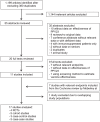Effectiveness of the 23-Valent Pneumococcal Polysaccharide Vaccine (PPV23) against Pneumococcal Disease in the Elderly: Systematic Review and Meta-Analysis
- PMID: 28061505
- PMCID: PMC5218810
- DOI: 10.1371/journal.pone.0169368
Effectiveness of the 23-Valent Pneumococcal Polysaccharide Vaccine (PPV23) against Pneumococcal Disease in the Elderly: Systematic Review and Meta-Analysis
Abstract
Background: Routine vaccination of elderly people against pneumococcal diseases is recommended in many countries. National guidelines differ, recommending either the 23-valent polysaccharide vaccine (PPV23), the 13-valent conjugate vaccine (PCV13) or both. Considering the ongoing debate on the effectiveness of PPV23, we performed a systematic literature review and meta-analysis of the vaccine efficacy/effectiveness (VE) of PPV23 against invasive pneumococcal disease (IPD) and pneumococcal pneumonia in adults aged ≥60 years living in industrialized countries.
Methods: We searched for pertinent clinical trials and observational studies in databases MEDLINE, EMBASE, Cochrane Central Register of Controlled Trials, and Cochrane Database of Systematic Reviews. We assessed the risk of bias of individual studies using the Cochrane Risk of Bias tool for randomized controlled trials and the Newcastle-Ottawa Scale for observational studies. We rated the overall quality of the evidence by GRADE criteria. We performed meta-analyses of studies grouped by outcome and study design using random-effects models. We applied a sensitivity analysis excluding studies with high risk of bias.
Results: We identified 17 eligible studies. Pooled VE against IPD (by any serotype) was 73% (95%CI: 10-92%) in four clinical trials, 45% (95%CI: 15-65%) in three cohort studies, and 59% (95%CI: 35-74%) in three case-control studies. After excluding studies with high risk of bias, pooled VE against pneumococcal pneumonia (by any serotype) was 64% (95%CI: 35-80%) in two clinical trials and 48% (95%CI: 25-63%) in two cohort studies. Higher VE estimates in trials (follow-up ~2.5 years) than in observational studies (follow-up ~5 years) may indicate waning protection. Unlike previous meta-analyses, we excluded two trials with high risk of bias regarding the outcome pneumococcal pneumonia, because diagnosis was based on serologic methods with insufficient specificity.
Conclusions: Our meta-analysis revealed significant VE of PPV23 against both IPD and pneumococcal pneumonia by any serotype in the elderly, comparable to the efficacy of PCV13 against vaccine-serotype disease in a recent clinical trial in elderly people. Due to its broader serotype coverage and the decrease of PCV13 serotypes among adults resulting from routine infant immunization with PCV13, PPV23 continues to play an important role for protecting adults against IPD and pneumococcal pneumonia.
Conflict of interest statement
The authors have declared that no competing interests exist.
Figures




References
-
- Rozenbaum MH, Pechlivanoglou P, van der Werf TS, Lo-Ten-Foe JR, Postma MJ, Hak E. The role of Streptococcus pneumoniae in community-acquired pneumonia among adults in Europe: a meta-analysis. European journal of clinical microbiology & infectious diseases. 2013;32(3):305–16. - PubMed
-
- Austrian R, Douglas RM, Schiffman G, Coetzee AM, Koornhof HJ, Hayden-Smith S, et al. Prevention of pneumococcal pneumonia by vaccination. Transactions of the Association of American Physicians. 1976;89:184–94. - PubMed
Publication types
MeSH terms
Substances
LinkOut - more resources
Full Text Sources
Other Literature Sources
Medical

